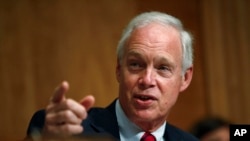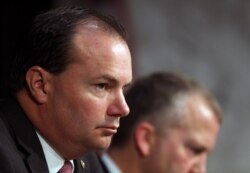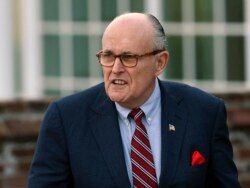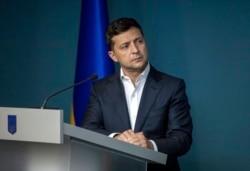This story originated in VOA’s Ukrainian Service. Nataliya Leonova reported from Washington and Myroslava Gongadze reported from Kyiv.
WASHINGTON/KYIV, UKRAINE — A senior Republican member of the U.S. Senate Foreign Relations Committee says that even if President Donald Trump refuses to unfreeze $250 million in military aid for Ukraine, Congress would replace the funding.
Senator Ron Johnson, a Wisconsin Republican and chairman of the Foreign Relations Subcommittee on Europe and Regional Security Cooperation, told the VOA Ukrainian Service Wednesday that even if Trump cancels the funding to help the country battle Russian aggression as planned, Congress would pass legislation to restore it.
“Regardless of what decision he makes, I’m very confident that Congress will come back in the next fiscal year, which is only right around the corner, Oct. 1, and then, through the appropriation process, make sure that even if President Trump decides not to spend it, we’ll give him no option but to spend it,” said Johnson, who had just returned from a tour of Eastern Europe.
Johnson, along with his Foreign Relations Committee colleague, Senator Chris Murphy, a Democrat of Connecticut, were barred from visiting Russia as part of a bipartisan congressional delegation that also had stops scheduled in the Balkans and Ukraine.
Senator Mike Lee, a Republican of Utah, however, received his visa for the Russian leg of the trip in what some are calling a Kremlin decision to curry favor with U.S. lawmakers who have voted against sanctioning Russia over election meddling and the 2014 annexation of Ukraine’s Black Sea peninsula of Crimea.
“What I tried to do is just kind of tamp down any concern about the lack of support or any kind of change in support for Ukraine,” Johnson said. “I can tell you from the first branch of governance in Congress: support for Ukraine, and primarily the Ukraine people, is virtually unanimous.”
Johnson, who met with Ukrainian President Volodymyr Zelenskiy while in Kyiv, said he was impressed with the newly installed leader’s approach to eradicating endemic corruption in the country.
“We went to the [opening of] the High Anti-Corruption Court ... and in his speech, President Zelenskiy says we’re not just going to fight corruption, we’re going to defeat it,” Johnson said. “Now that’s a tall order, but it shows a laudable goal, so we were very encouraged.”
That same endemic corruption, he added, is the very reason that Trump has called for a review of $250 million in pending military aid for Ukraine.
“You know, part of [Trump’s] rationale [for withholding the aid] is the level of corruption in Ukraine, but also his desire to make Europe really step up to the plate and honor their commitment to their own regional defense,” said Johnson, who told VOA he has personally discussed the matter with Trump.
Last week, The Washington Post published an editorial slamming the Trump White House for withholding the military aid over what it called explicitly political purposes.
On Monday, three House committees issued letters to the State Department and the White House requesting documents about a recent trip to Europe by Trump’s personal lawyer, Rudolph Giuliani, who in August asked top Zelenskiy aide Andriy Yermak to investigate the role of Hunter Biden, the son of former Vice President and Democratic presidential hopeful Joe Biden, on the board of a Ukrainian gas company.
Committee members from the House, which has a Democratic majority, accuse Trump of withholding the military aid to extort Ukrainian compliance with Giuliani’s request to investigate Biden.
In an interview with VOA’s Ukrainian Service last week, a senior administration official failed to confirm whether the $250 million in question was currently under active White House review.
On Tuesday, however, Ambassador William Taylor, who is currently the charge d’affaires of the U.S. Embassy in Kyiv and served as ambassador to Ukraine from 2006 to 2009, told VOA the White House review was likely nearing completion.
“There is a review that is taking place right now,” Taylor said in an interview in Kyiv. “It must be nearly done, because we’ve heard that the people who are reviewing have made their recommendations to the White House, and so we’re waiting for the conclusion of that review.”
Taylor also called U.S.-Ukraine military cooperation “very strong,” adding that “this administration has provided more security assistance in more ways, including lethal weapons, than at any time in the past.”
If the White House makes no determination on the withheld military aid for Ukraine by the end of federal fiscal year Sept. 30, the funds expire.
Taylor also said there are signs that “the Kremlin would like to get out of Donbas,” a Russian-backed secessionist region in Eastern Ukraine.
“I think sanctions are having a real effect on Russia, on Russian individuals, and the Russian economy more broadly,” he said, adding that, beyond sanctions, the cost of maintaining a Russian presence on Ukrainian soil is financial burden in its own right.
Taylor also discussed an impending meeting between Trump and Zelenskiy.
“They are in the process of scheduling it now,” he said. “They will both be in New York for the U.N. General Assembly and that will take place in two weeks. President Trump has meetings that he’s scheduling and President Zelenskiy has meetings he’s scheduling, so it’s a matter of making those schedules fit.”
The last meeting between sitting U.S. and Ukrainian presidents was in April 2016, when former president Barack Obama met with former Ukrainian President Petro Poroshenko.







